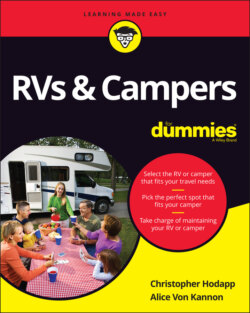Читать книгу RVs & Campers For Dummies - Christopher Hodapp - Страница 33
Surveying the Wide World of RVs and Campers
ОглавлениеIN THIS CHAPTER
Learning the ABCs of motorhomes
Surveying the crowded landscape of towable trailers
Piggybacking on your pickup with truck campers
Any RV is like a small vacation home that happens to have wheels and a license plate. Like vacation homes, RVs can be as simple as a tent, as cozy as a cabin, or as spacious as a penthouse suite. But unlike a house, you can pack up and move it to a different location when you get bored with the surroundings, irritated with your neighbors, or numbed by the weather. Try that with a timeshare condo.
The term recreational vehicle (RV) is an all-purpose tote bag crammed full of types of vehicles to choose from. (Arguably, a bike is a recreational vehicle, but we won’t get into semantics.) The RV world has its own vocabulary that can baffle a beginner. But all the different types of RVs and campers can be divided into three basic categories:
Travel trailers or towables: These don’t have their own engines, so you have to pull them behind something else, called a tow vehicle.
Motorhomes or coaches: These are self-contained, drivable RVs with built-in engines. No tow vehicle is required.
Truck campers (sometimes called truck caps or camper shells): These actually have to ride piggyback on another vehicle — usually a pickup truck.
You can find all kinds of variations within these categories, more every day it seems, but these are the basics you’ll encounter when the love of your life suddenly elbows you at 7 a.m. on a Saturday and says, “Let’s go to the RV show!”
The type of RV or camper you ultimately pick will depend on how you plan to use it — your needs and wants. But you can’t (or at least shouldn’t) make that decision without knowing what’s available. So, that’s what we cover in this chapter. If you don’t have an RV or camper yet but you’re looking to get one, this is the chapter for you!
